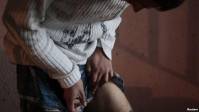Crimea’s Methadone Ban hits Rehabilitation Patients hard

As many as 20 people who were being treated for heroin addiction in the Ukrainian region of Crimea have died since the Black Sea peninsula was annexed by Russia in March.
Dozens more have left the region for other parts of Ukraine in a bid to continue methodone treatment. The heroin-replacement therapy, which is widely used in the West, is considered ineffective by Russian health specialists and is banned in that country.
Crimea’s de facto authorities claim heroin addicts have been taken care of since Moscow took over.
"Nearly 700 people have been taken off replacement therapy and about 60 are being treated in health-care facilities, " says Sergei Donich, a former regional health minister and currently deputy prime minister in the region’s de facto government, tells RFE/RL.
"The next phase is work with psychiatrists and public organizations which will help ensure these people do not return to their pernicious way of life."
But according to Ukrainian sources, more than 800 addicts were undergoing methadone treatment in Crimea before the annexation. Many of them were also suffering from other diseases, including HIV/AIDS, hepatitis C, and tuberculosis.
"The deaths of tens of people were identified in a report by an international mission of the European Commission at the end of May, " says Pavlo Skala, of the International HIV/AIDS Alliance in Ukraine. "We are talking of, at least, 20 patients."
’Thinking Of Suicide’
For his part, Donich denies that anyone has died and says the patients suffering from other diseases are getting "proper medical care."
"There have been no lethal outcomes, " he said.
Olena Kucheruk, an activist with the Kyiv-based NGO "Rebirth, " says her organization has been able to find financing to send 57 patients from Crimea to other parts of Ukraine to continue their methadone treatment.
RFE/RL’s Ukraine Service spoke to one of them, a young woman in her twenties who asked to be identified only as Oksana.
"When I learned that our program was being shut down in Crimea, it was a huge shock for me, " Oksana says. "I didn’t know what to do and was hysterical. The only possibility for me was to move to Kyiv and continue my treatment here."
She says that she knows other Crimean patients who haven’t been so lucky.
"Many of them are thinking of suicide, " she says. "And several have already tried. There is no way out for those who are still there."
Activist Skala says closing down Crimea’s methadone program has led to an increase in drug trafficking on the peninsula, criminal activity that he suspects is protected by corrupt police officers.
De facto Crimean Deputy Prime Minister Donich, however, says that methadone treatment is not effective.
"The money and interests of pharmaceutical firms stand behind it, " he says.
Leonid Vlasenko, a Kyiv doctor who specializes in narcotics treatment, says replacement therapy helps "a large number of people, " in part because it keeps them from engaging in illegal activities and enables them to seek treatment for their other health problems.
"Studies show that people receiving this treatment live longer, are sick less often, and are more socially adapted, " Vlasenko says.
http://rferl.org/content/crimeas-methadone-ban-hitting-rehab-patients-hard/25429665.html





